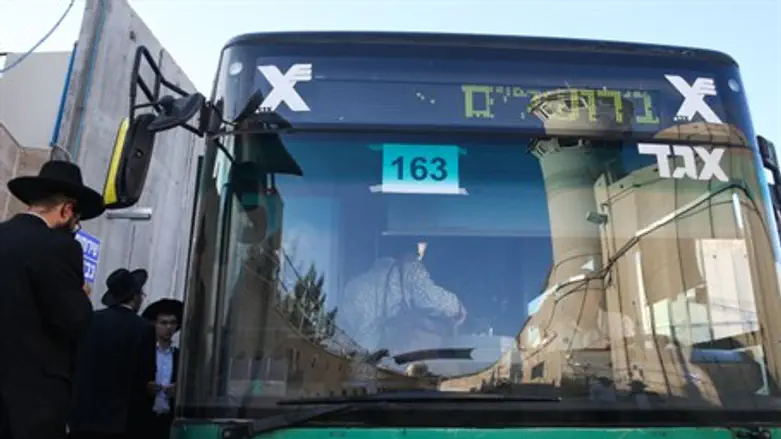
Judea-Samaria residents can finally hail good news, officials revealed Tuesday: on November 14, several new bus lines will be added for the convenience of Jewish communities.
Egged bus lines are being scrapped and will be replaced, instead, by Egged Transport lines, which should see the service improve drastically in several regions, and particularly provide better service between smaller communities and Modi'in, Jerusalem, and Ariel.
The modern buses will also be 'greener' and run more often, officials say.
Changes and improvements are planned under the guidance of the National Authority for Public Transportation in cooperation with local authorities in the Binyamin and Samaria Regional Councils, after studies were done on passengers' needs, traffic patterns, and the security situation.
In addition, 18 new lines will be added, including a direct line from Ariel to Jerusalem, a quick means of hopping between Jerusalem and Tel Zion, and two express lines from Nahliel and Dolev to Modi'in.
Routes 146, 149, 461, 462, 463, 466, 467 and 468, will use bulletproof buses and carry passengers from Judea-Samaria to the Jerusalem Light Rail station in Pisgat Ze'ev. It has been noted that this is the optimal layout for the lines, both in destinations and in frequency, taking into account the security constraint requiring the use of armored buses in the region.
From Pisgat Ze'ev, passengers will be able to continue on to other destinations in Jerusalem, via bus or tram, at no extra charge with their Rav-Kav cards.
Preparing for change
The National Transportation Authority will distribute leaflets explaining the changes in the coming weeks, and bulletins will be placed on billboards in all affected areas.
Transportation Minister Yisrael Katz (Likud) said that the comprehensive plan to upgrade public transportation in Judea-Samaria was formed after concerns were raised over residents' security on existing lines.
"The program is designed to provide effective solutions for the particular situation in Judea-Samaria and deal with the deterioration of residents' personal security," Katz stated. "It is the State of Israel's supreme duty to make public transport safer for all youth and adults in Judea-Samaria, and the plan was formulated adequately to the special problems existing there, including the wide dispersion of communities and traffic routes."
The change is expected to please many Judea-Samaria residents, who have been relying on hitchhiking for years due to the lack of bus routes from smaller communities - and the unreliability or impracticality of existing bus routes.
For example, the new lines are due to replace the original Egged 148 line between Ariel and Jerusalem, which took between 90 minutes to 2.5 hours for a journey that - when direct - is usually 40 minutes by car.
Instead of a direct route, however, it stopped at every community along the way, including Ofra, Shiloh, Eli, Ma'ale Levona, and Tapuah, among others. The new directives, by contrast, will introduce a direct line for Ariel residents and enable residents of Shilo and Eli, for example, to travel across Judea-Samaria without being forced to wait for the composite bus route.
On a more serious level, the change also follows numerous complaints of overcrowding on local buses, after a 2013 decision allowed Arab workers to take state-subsidized public transport, and the murder of three Israeli teenagers in June after they were forced to hitchhike their way home from school.
A full map, in Hebrew, of the new bus system is available here.